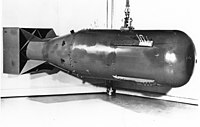
Photo from wikipedia
OBJECTIVE The aim of this study was to determine the level of knowledge of students receiving different levels of health-care education (doctors, nurses, paramedics) on chemical, biological, radioactive, and nuclear… Click to show full abstract
OBJECTIVE The aim of this study was to determine the level of knowledge of students receiving different levels of health-care education (doctors, nurses, paramedics) on chemical, biological, radioactive, and nuclear weapons (CBRNW). METHODS This study was designed as a qualitative, descriptive, and cross-sectional research. The study reached 87.68% of the population. A survey form was created by the researcher in line with the literature. Ethical permission and verbal consents were obtained. The data were collected by face-to-face interviews. RESULTS It was observed that there was no difference between the enrolled departments, that the participants had very low levels of knowledge on the subject despite considering it a likely threat for Turkey, and that they thought the public and the health-care professionals in this field had insufficient knowledge. Sex, age, and field education were the variables that created a difference. CONCLUSION Training regarding CBRNW should be further questioned and individuals should receive ongoing training to increase and update their knowledge and skills.
Journal Title: Disaster medicine and public health preparedness
Year Published: 2021
Link to full text (if available)
Share on Social Media: Sign Up to like & get
recommendations!